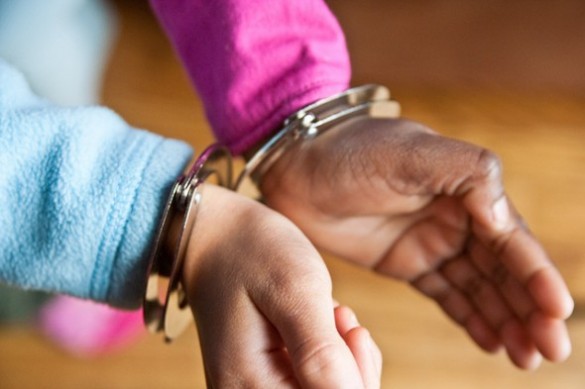
Every year, New York courts incarcerate hundreds of youths under the age of 16, placing many in facilities more than 200 miles from home. Advocates and criminal justice experts say keeping youths in these facilities makes them more likely to repeat their offenses by cutting them off from families that are a source of support and communities who understand their problems best. The New York State legislature is considering a plan that would reform the system.
LLOPIS-JEPSEN: A lot of the youths that New York incarcerates haven’t committed serious offenses. That’s according to Gabrielle Prisco, the director of the Juvenile Justice Project at the prison watchdog group, the Correctional Association of New York. She says most are guilty of misdemeanors.
PRISCO: So children could be in placement for having marijuana. Or a turnstile jumping is a common reason kids get arrested in NYC.
LLOPIS-JEPSEN: Prisco is sitting in her office, pointing to a map of New York State. It shows more than a dozen juvenile facilities run by the Office of Children and Family Services.
PRISCO: In these facilities we have children who could be as young as seven.
LLOPIS-JEPSEN: The problem, she says, is that most of them are from New York City, yet some of the facilities are more than 200 miles away. She’s concerned that life in them traumatizes young offenders. Some of the facilities are a lot like prison: High walls with barbed wire, mesh on the windows, and jail cells. And in 2009, the federal government threatened to take over the state’s juvenile facilities after finding a pattern of abuse.
The proposed changes would bring a lot of these young offenders to facilities *in* New York City. The plan would affect about 600 youths to start with. The legislation is included in Governor Andrew Cuomo’s executive budget, and Mayor Michael Bloomberg supports the changes, too. Prisco says this is the moment that advocates have been waiting for.
PRISCO: It’s an incredibly exciting moment. We are basically at the table drawing the blueprints of a new system.
LLOPIS-JEPSEN: But not everyone is happy. The Civil Service Employees Association represents workers at the facilities that stand to lose their residents. In a statement, the union said incarcerated youths are locked up because they deserve to be, and that it makes no sense to keep them in the communities where they got into trouble in the first place.
Even reform advocates aren’t sure exactly how the changes will play out. The legislation requires New York City to draw up and submit a proposal. But Jeffrey Butts, head of the Research and Evaluation Center at John Jay College of Criminal Justice, says it’s not clear that this will work out for the better.
BUTTS: It’s risky because states across the country have had fairly stable traditional approaches for youthful offenders, and this is asking a state to rethink how it handles serious youthful offenders.
LLOPIS-JEPSEN: Reform advocates would like to see a network of community-run programs, and facilities that are less like prison and offer educational programs, mental health treatment and other options. Prisco says officials need to make sure the system has clear standards and robust plans to evaluate the new network of juvenile facilities.
PRISCO: So that we’re not just transferring kids to New York City without making sure that some of the problems that have plagued the state system won’t just be replicated at the city level.
LLOPIS-JEPSEN: It isn’t clear when the legislature will take up the package that includes the reforms, but the deadline is April 1.
Celia Llopis-Jepsen, Columbia Radio News.



